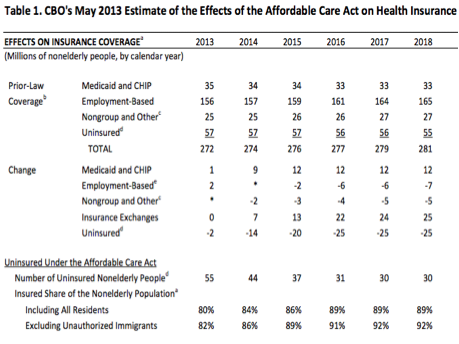The following is a script of “Obamacare” which aired on Jan. 11, 2015. Lesley Stahl is the correspondent. Rich Bonin, producer.
This month marks one year since health insurance coverage under the Affordable Care Act began, and from the president’s point of view: so far, so good. More than 10 million Americans who didn’t have health insurance before have signed up. But congressional Republicans are gunning for Obamacare. Even if they can’t outright repeal it, they want an overhaul.
And with the debate just getting underway, author Steven Brill, who has spent the past two years immersing himself in the subject, has come out with a new book, “America’s Bitter Pill,” that takes a comprehensive look at what the new law does and doesn’t do. Brill argues that Obamacare is the product of what he calls an “orgy of lobbying” and backroom deals in which just about everyone with a stake in the $3-trillion-a-year health industry came out ahead – except the taxpayers.
Steven Brill: Good news: More people are gonna get health care. Bad news: We have no way in the world that we’re gonna be able to pay for it.
Steven Brill says that the outrage is what the Affordable Care Act doesn’t do.
Steven Brill: It doesn’t do anything on medical malpractice reform. It doesn’t do anything to control drug prices. It doesn’t do anything to control hospital profits.
Lesley Stahl: So all the cost controlling side of this just went by the wayside?
Steven Brill: 99 percent of it.
Brill learned that when it came to controlling costs, the White House was told up front–
Steven Brill: If you go after costs, you’re never going to get anything passed because the lobbyists will just not allow it to be passed.
Lesley Stahl: So let’s go through what each entity won.
Steven Brill: The drug companies they were going to get $200-plus billion worth of new customers able to pay for drugs. They were going to avoid the calamity of the real reforms that they were worried about: price controls generally.
Lesley Stahl: Canada.
Steven Brill: You and I being able to buy drugs from Canada. That would have cost them hundreds of billions.
The hospital lobby did agree to cuts in how much the federal government compensates them for Medicare patients, but Brill says overall the trade off in new paying patients would more than make up for that. And the hospitals managed to keep other cost controls completely off the table, allowing them to charge whatever they can get for hospital stays and greatly mark up drug and test prices.
In writing his book, Brill wanted to find out how hospitals jack up those prices. He found the answer in the Recchi family of Lancaster, Ohio. Their experience, both before and after Obamacare kicked in, shows all the things Brill says the law should’ve dealt with — like highly inflated hospital charges — but didn’t.
Sean Recchi: I just want to get healthy and that’s what I told ’em.
Their story begins in 2012 when Sean Recchi – then 42, father of two – was diagnosed with cancer, stage 4 non-Hodgkin’s lymphoma.
Sean Recchi: I have two young children. You know, I wanna see ’em get married. I wanna see my grandchildren. You know. Too early.
Stephanie was determined to get him to MD Anderson in Houston, one of the premier non-profit cancer centers in the country. But because their health insurance policy was so limited, they had to pay upfront: first $48,900 for the evaluation…then more for the actual treatment.
Stephanie Recchi: And they told me that we would have to give them another $35,000 to get him, to get chemo.
Lesley Stahl: Did you have the money?
Stephanie Recchi: I didn’t. My mother did.
Lesley Stahl: Your mother had to give you the money?
Stephanie Recchi: Yes. I just kept thinking in the back of my mind, there’s a mistake and we’ll work it out. I just have to get him there and I have to get him better. That was my main concern.
When Sean was sick, they felt vulnerable and scared. Like most people in that kind of crisis, they never once asked what any specific item or test cost. When they got the bill, they gave it to Steven Brill, who found charges he couldn’t believe.
Steven Brill: The first thing I saw in the bill was a generic Tylenol for $1.50. Now that’s not–
Lesley Stahl: One pill?
Steven Brill: One pill. You can buy 100 generic Tylenols for the same $1.50. So that’s 1,000 percent mark-up. But who cares, it’s just $1.50. As you start going down the bill, they had something like $15,000 worth of blood tests that Medicare would’ve paid a few hundred dollars for.
The charges add up – over the single-spaced 18 pages of the bill. Independent hospital economists say these are all greatly inflated over their actual costs:
Like a PET scan for $5,453 – a 400 percent mark up.
Three CT scans for $9,685 – an 1,100 percent mark up.
The charge for his room was $10,746 for six days. That comes to $1,791 a day.
Steven Brill: You and I need to get into this business. It’s a really good– They call it nonprofit, but it’s a good business.
The single largest charge was for his cancer drug, Rituxan: for one dose, the hospital billed him $13,702.
Steven Brill: The hospital paid $3,500 for that drug. OK?
Lesley Stahl: How many times – that’s for–
Steven Brill: That’s a 400 percent mark up.
Lesley Stahl: This is a nonprofit hospital. What does nonprofit mean?
Steven Brill: It means they don’t pay taxes, that’s the first thing it means.
Lesley Stahl: They don’t pay any taxes?
Steven Brill: They’ve created in health care an alternate universe economy, where everybody except the doctors and the nurses, makes a ton of money. And nobody is holding them accountable and Obamacare does zero to change any of that.
MD Anderson declined to appear on camera but sent us a letter defending the prices it charges patients, saying, the costs reflect in part “using and maintaining expensive, state-of-the-art medical equipment… [and] research to develop new and better treatments.”
But Brill says hospitals get some federal aid for new technology and says in general large nonprofit hospitals are thriving businesses. He suggested we go to Pittsburgh. Once a steel city, today Pittsburgh’s biggest business is a hospital complex, the University of Pittsburgh Medical Center. Its CEO, Jeffrey Romoff, showed us the view from his office.
Read the full article here.
Contact Steven G. Cosby, MHSA with questions or to request more information and to schedule a healthcare plan evaluation, savings analysis or group plan solution for your company.



